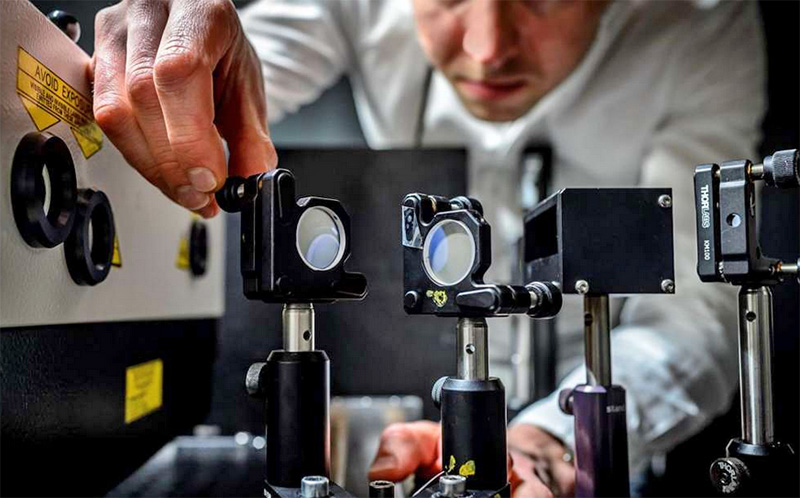Where is Ctein when you need him? I shouldn't be writing this. Researchers at Lund University in Sweden recently announced that they have developed the world's fastest camera, capable of five trillion exposures per second, according to an article at IFLScience. I couldn't find an April 1st dateline. The article claims the scientists can photograph light itself, traversing a distance equivalent to the thickness of a sheet of paper. "The researchers could film events as short as 0.2 trillionths of a second, the fastest ever possible. This is fast enough to actually visualize the movement of light. You can see this in the video [at the link], which shows the movement of light in femtoseconds—one millionth of a billionth of a second...."
Things like this are why less educated people mistrust science. How is this less preposterous than alien flying saucers or ghost sightings, on the face of it?
Anyway, we're photographers, so no worries! Our usual reflexes tell us how to respond: "I need one." Your Sony A7R II, Leica SL Typ 601, Canon 5DS R or Fuji GFX-50S all just got horribly, pathetically inadequate. Sorry. Start saving now.
First guy who owns a 5-trillion FPS camera wins.
Mike
(Thanks to Steven Ralser)
Original contents copyright 2017 by Michael C. Johnston and/or the bylined author. All Rights Reserved. Links in this post may be to our affiliates; sales through affiliate links may benefit this site.
Not fast, but good, but not fast
Give Mike a “Like” or Buy yourself something nice
(To see all the comments, click on the "Comments" link below.)
Featured Comments from:
Zack Schindler: "Yeah the camera might be fast but how good is the bokeh? And some of the pictures are soft in the corners when I blow them up 2000%. Don't see any mention about how good the micro contrast is. Not going to buy the current version but will wait until the next one comes out because the rumor site says that it will be twice as betterer! Oh and the rumor site also says that Leica is coming out with one wrapped in unicorn leather rubbed with mermaid tears."
Paul: "How many frames can this camera take before the buffer is full? I assume that the whole duration that can be photographed/filmed that way is less than a millisecond. And since most of our subjects tend to move or change very, very little over such a short time, you may as well make do with shooting a single frame instead of taking the same photo more than a billion times ;-) .
"Now on the other hand, if you average all of them, the result should be completely noise-free. Hmmm...."
Bill Tyler: "Here's a little background for readers who aren't chemists or physicists. That diagram is a take-off on phase diagrams used to show the states of matter (solid, liquid, gas) at various combinations of temperature and pressure. Here's an example, for water."
hugh crawford: "Re 'the fastest camera ever, able to capture an astonishing 5 trillion frames a second.' All true except that it's not a 'camera,' it can't take 'frames' (I assume if it is recording a single photon it has a resolution of one pixel?) and it can't run for a second, so no five trillion 'frames.'
"It's sort of like saying the Bugatti Veyron Super Sport can go 254 miles in an hour, except that you would have to stop for gas six times, replace the tires about five times, and replace the wheels once or twice. 'A set of the Super Sport’s special Michelin tires costs $42,000 and may last 10,000 miles if you’re careful, though they last only 15 minutes at the car’s top speed (at that pace, however, the 26.4-gallon tank is sucked dry in just 10 minutes, and there’s no place on Earth to safely go that fast that long anyway, so no worries). At the third tire replacement, Michelin requires that you also swap out the $69,000 wheels—coincidentally, the only wheels that fit those tires—to ensure a proper bead seal.'"
vijay: "And you thought editing was hard now...."
Norm Nicholson: "To overcome this problem, I am planning on working on a project that I am calling “BRAIN” (Binary Recursive Anal Intensive Nooks.) The concept is brilliantly simple, or perhaps simply brilliant. Say you take a photo of your friend Paul standing on the grass in front of your house. Sometime later you look at that photograph. Now who better to analyze that photo than you? My device scans your brain! (neurons, neuralgic synapses, hemispheric kinks, thought patterns, etc). When it finishes scanning scanning your brain, BRAIN quickly categorises your photo for you. With sufficient funding, it should be ready in a few months. P. S. Mike, can you direct me to a good Crowd Funding website?"
Mike replies: Can't you scan my brain for that information?
Stephen S. Mack: "Wins what?"
Mike replies: Ooh, now you're getting all bro-existential.
Nicholas Condon: "Okay, I am not Ctein, but I am an honest-to-Feynman optical scientist (who specializes in lasers and nonlinear optics), so I pulled the original paper and read it. This is amazingly clever stuff, but it's not exactly what you'd call a general-purpose camera. For one thing, its temporal resolution is provided by the exotically short laser pulse used for illumination, which puts some rather stringent limits on the sort of thing being imaged. It's also not exactly going to acquire a 10-second burst of images, either...."



